The tide of going abroad in search for knowledge and a better life started about 20 years ago, when China was underdeveloped and had just opened its door to the world. Over the years, many of them have established their careers, and are enjoying decent lives overseas. However, returning has remained to most of them a long-cherished dream. Is it the market profitability, the career path, or something else that has motivated them to come back? Is their homebound journey an easy one? Today’s Market Analysis will take a look at this issue through a visit to the overseas scholars convention in the country’s south.
The chilly weather does not undermine the enthusiasm of the attendees at the Fifth Convention of Overseas Chinese Scholars in Science and Technology, just held in Guangzhou in southern China. As an annual event aiming at bridging overseas talents with home institutions, the convention offers opportunities for both sides. Since 1998, around 4,000 people and 1,000 organizations have participated, and over 4,000 high technology projects have been initiated.
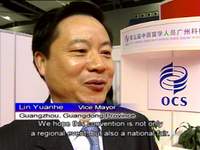 Lin Yuanhe, vice mayor of Guangzhou, Guangdong Province: We hope this convention is not only a regional event, but also a national fair. As an open platform, it aims to connect the overseas students with home organizations. To cater to different requirements, we offer a variety of venues so that the attendees can always find what they need.
Lin Yuanhe, vice mayor of Guangzhou, Guangdong Province: We hope this convention is not only a regional event, but also a national fair. As an open platform, it aims to connect the overseas students with home organizations. To cater to different requirements, we offer a variety of venues so that the attendees can always find what they need.
It is easy to get lost, should one not have a clear idea in mind, as there are a variety of events this year. For instance, at Forum, issues including bioscience technology, sustainable development and starting business in China, are discussed. Project Promotions is hosted by inventers and advocators of new technologies in areas such as new materials and energy, Internet technology and advanced manufacturing methods. The central and local governments, and various government bodies from across the country have set up their stands at the convention. Also present are over 20 overseas associations for Chinese scholars. Apart from this, there is the exhibition of success stories of overseas returnees. However, the stands for enterprises, research institutes, colleges and universities are perhaps the most frequently visited by those planning to return.
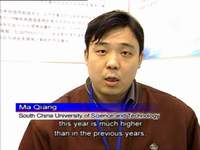 Ma Qiang, University of Science and Technology in South China: The number of people attending the convention this year is much higher than that in previous years, and they are indeed talented people. Yesterday our president was here for eight hours, and he didn’t even get a chance to stop talking with the attendees. Some of them are interested in starting business; others are seeking opportunities for development.
Ma Qiang, University of Science and Technology in South China: The number of people attending the convention this year is much higher than that in previous years, and they are indeed talented people. Yesterday our president was here for eight hours, and he didn’t even get a chance to stop talking with the attendees. Some of them are interested in starting business; others are seeking opportunities for development.
Most of the overseas Chinese scholars, who have been away for over a decade, are quite established in their careers. Eighty-five percent of the overseas attendees this year have Master’s degrees or higher. Thirty percent of them intend to bring hi-tech projects and expertise back and are looking for investment and partnership.
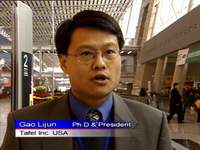 Gao Lijun, PhD and President, Tafel Inc. USA: The overseas scholars, those with high education and experienced in the application of the world’s most cutting-edge technologies, are an important source of talent for the country. Different levels of the Chinese government have issued various policies to attract them to return. The latest one sounds exciting.
Gao Lijun, PhD and President, Tafel Inc. USA: The overseas scholars, those with high education and experienced in the application of the world’s most cutting-edge technologies, are an important source of talent for the country. Different levels of the Chinese government have issued various policies to attract them to return. The latest one sounds exciting.
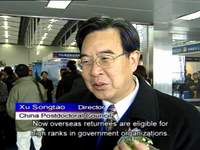 Xu Songtao, director of the China Postdoctoral Council: Now, overseas returnees are eligible for high ranks in government organizations. They can also choose to be in positions such as CEO in enterprises. Moreover, according to their capabilities, they are even entitled to become chairpersons in colleges and universities.
Xu Songtao, director of the China Postdoctoral Council: Now, overseas returnees are eligible for high ranks in government organizations. They can also choose to be in positions such as CEO in enterprises. Moreover, according to their capabilities, they are even entitled to become chairpersons in colleges and universities.
It is a commonly held misconception that most overseas students have come back to start their businesses. There are, actually, a lot more who work for research institutes and universities than those who engage in business. Such is really their success that they have gained as much recognition at home as overseas.
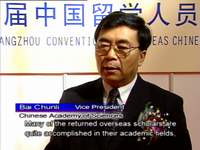 Bai Chunli, vice president of Chinese Academy of Sciences: Many of the returned overseas scholars are quite accomplished in their academic fields, being equipped with the world’s latest technologies, modern management ideas and the spirit of innovation. They are the much-needed fresh blood for the country, and have been playing key roles in enhancing scientific development. We provide them with labs and assistants to help them with their research.
Bai Chunli, vice president of Chinese Academy of Sciences: Many of the returned overseas scholars are quite accomplished in their academic fields, being equipped with the world’s latest technologies, modern management ideas and the spirit of innovation. They are the much-needed fresh blood for the country, and have been playing key roles in enhancing scientific development. We provide them with labs and assistants to help them with their research.
At the convention, many visitors are gathered around the stand of Chongqing Institute of Technology, attracted by its bold idea of setting up the Overseas Returnees Pioneering Area within the campus, in cooperation with the city’s High and New Technology Development Zone. It is, up till now, the first such endeavor in the country.
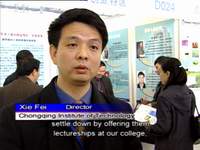 Xie Fei, director of Chongqing Institute of Technology: The idea is to first help the overseas returnees settle down by offering them lectureships at our college, and then try to help them convert technologies into products by making use of preferential policies of the development zone such as financing, tax, bank loans, and housing. We hope that the three parties, the college, the development zone and the returned scholars can all benefit from this project.
Xie Fei, director of Chongqing Institute of Technology: The idea is to first help the overseas returnees settle down by offering them lectureships at our college, and then try to help them convert technologies into products by making use of preferential policies of the development zone such as financing, tax, bank loans, and housing. We hope that the three parties, the college, the development zone and the returned scholars can all benefit from this project.
While in the capital, the Beijing Polytechnic University has also taken a series of measures in attracting overseas talents, but with another perspective.
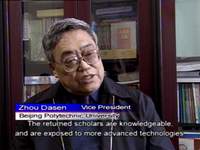 Zhou Dasen, vice president of the Beijing Polytechnic University: The returned scholars are knowledgeable, and are exposed to more advanced technologies. But to make the technologies work in a domestic environment, they need coaching and experiences from home experts.
Zhou Dasen, vice president of the Beijing Polytechnic University: The returned scholars are knowledgeable, and are exposed to more advanced technologies. But to make the technologies work in a domestic environment, they need coaching and experiences from home experts.
To those who have just moved back from overseas, the Beijing Polytechnic University provides them with 30,000 to 50,000 RMB to start up their research and teaching. On top of providing them with a team of assistants and labs, their families are also entitled to a series of preferential policies. In the past few years, over 200 returnees have settled down in this university.
Dr. Li Zhenbao is one of them, who used to work in Japan as a successful earthquake researcher. He is member of major associations on structure and concrete architecture, and has won several awards at academic seminars and conferences in this field. Though the living and working conditions now are far from satisfactory, this is not what he came back for.
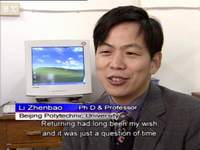 Li Zhenbao, Ph.D and Professor of the Beijing Polytechnic University: Returning had long been my wish, and it was just a question of time. I love to share whatever achievements I made with my family and friends back home. Only from this am I emotionally satisfied.
Li Zhenbao, Ph.D and Professor of the Beijing Polytechnic University: Returning had long been my wish, and it was just a question of time. I love to share whatever achievements I made with my family and friends back home. Only from this am I emotionally satisfied.
However, some other overseas scholars are trying to make their contributions to the country by starting their businesses, inspired by the huge market opportunities. The Guangzhou Entrepreneur Garden, an incubator for the overseas returnees, was set up in August, 1999. The first group of enterprises is already in operation.
Dr. Yuan Jianhua, who studied and worked at Harvard University in the USA, returned three years ago, and has invested in three companies ever since, two in bioscience and one in real estate. He is a successful example of what a scholar can achieve in business. When it comes to his ventures, Dr. Yuan has a lot to say.
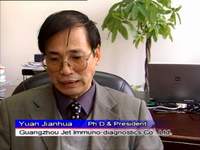 Yuan Jianhua, Ph.D and President of Guangzhou Jet Immuno-diagnostics Co. Ltd.: We don’t have enough experiences on administration for company. We don’t have enough experiences on marketing, either. Otherwise, we don’t have enough money to support our research work.
Yuan Jianhua, Ph.D and President of Guangzhou Jet Immuno-diagnostics Co. Ltd.: We don’t have enough experiences on administration for company. We don’t have enough experiences on marketing, either. Otherwise, we don’t have enough money to support our research work.
Also engaged in biomedicine development, Dr. Chen who came back from the United Kingdom, obviously has different experiences from Dr. Yuan. His is more negative.
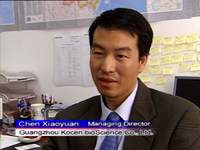 Chen Xiaoyuan, managing director of Guangzhou Kocen Bioscience Co. Ltd.: When you think about coming back to China to do something, you must have some sort of psychological preparation. The business environment is different in China…a lot of problems. But as I have been here for nearly two years, I can say that everything is developing very quickly.
Chen Xiaoyuan, managing director of Guangzhou Kocen Bioscience Co. Ltd.: When you think about coming back to China to do something, you must have some sort of psychological preparation. The business environment is different in China…a lot of problems. But as I have been here for nearly two years, I can say that everything is developing very quickly.
It is agreed that success depends on major factors such as personal ability, opportunities and the environment. To overseas returnees, the environment in which they have grown up has changed so drastically that they find it difficult to adapt to. To solve the problems like this requires long-term efforts.
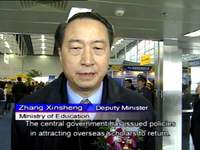 Zhang Xinsheng, deputy minister of the Ministry of Education: The central government has issued policies in attracting overseas scholars to return. Now it is the matter of how to implement them. And it will take more time and efforts to fully implement the policies at different levels and in all places across the country.
Zhang Xinsheng, deputy minister of the Ministry of Education: The central government has issued policies in attracting overseas scholars to return. Now it is the matter of how to implement them. And it will take more time and efforts to fully implement the policies at different levels and in all places across the country.
We might have done much to stimulate the returning of overseas talents, but how to retain them and moreover, how to make their homeward pilgrimage successful and worthwhile, are still questions without clear-cut answers. It seems that their way of returning is not an easy one.
The most recent report in the Beijing Youth Daily says Wuhan in central China initiated a project to financially aid overseas returnees, but now 15 percent of those who received funding have resigned from their jobs. Who is going to be blamed, the local government, the organizations that they work for, or the returnees themselves? Let’s see the segment of Business Life -- a display of the daily lives of three returnees, which might offer some clues.
|